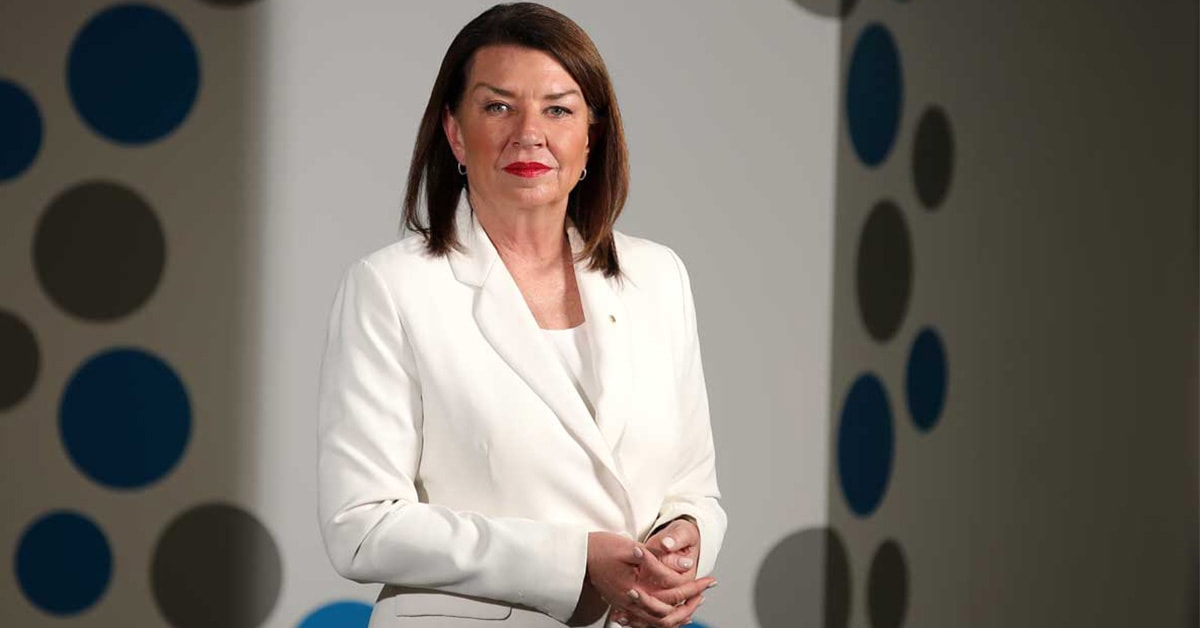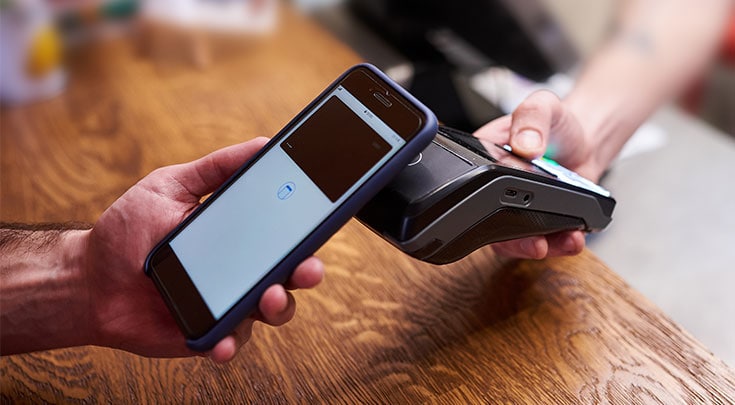25 February 2022
Transcript: 2GB Afternoons with Deb Knight
Anna Bligh spoke with 2GB’s Deb Knight on the transforming banking landscape, from the reduction of customer cash use, the rise of tap’n’go, and the increasing use of online 24/7 banking. Banks are responding to changes in customer behaviour, but retaining services for those that need it – including paying off credit cards with cash at bank branches.
Deb Knight We’ve heard a lot about banks today because in the paper today there’s this story about the NAB not letting people use cash to pay off their credit cards. And you would have heard Ben Fordham on breakfast this morning too, a lot of people missing their local bank branches and their ATMs because a lot have been shut to save costs for the banks, as more customers go online. But is it going to make our lives easier? And is it already making our lives easier with all the online banking? Or is it a pain? Is it actually causing dramas for you?
We thought we’d talk more about this with Anna Bligh, the boss of the Australian Banking Association, who is on the line for us now. Anna welcome back to afternoons. Before we talk banking, I just want to hear what would you do with $120 million? You wouldn’t put it in the bank, would you?
“it is absolutely the case that whether you’re a NAB customer or a customer of any other bank, you can pay your credit card in cash over the counter, either in the bank branch or at an Australia Post outlet.”
Anna Bligh I was just listening to all of that and thinking what would I do, there are so many good things you could do with it? But yes, I would put it in the bank (laughter).
Deb Knight You would you don’t get enough, enough interest? You’d have to put it somewhere else! (laughter).
Anna Bligh Well, I certainly wouldn’t put it under the bed (laughter).
Deb Knight That is true. That is true. So, look, I want to cover up on this stuff with the ATMs that Ben Fordham was talking about on his show this morning. And he was sort of saying anecdotally that a lot of banks are actively, he thinks, trying to remove ATMs. Is that the case?

Anna Bligh Well, first of all, I should say that we are seeing a massive transformation in how customers are banking and how they’re paying for goods and services. And that is changing the face of Australian banking. So yes, we’re seeing a very sharp rise in the use of debit cards for cash, or for what was once cash transactions, we’ve had nearly a 20% increase in people using tap and go, and more than a 10% decrease in people using cash. So, we’re not about to see the ATM network disappear. It’s a very important part of banking services. But people are using them less and less, so we are going to see less of them.
“we’re seeing a very sharp rise in the use of debit cards for cash, or for what was once cash transactions, we’ve had nearly a 20% increase in people using tap and go, and more than a 10% decrease in people using cash”
Deb Knight So we are seeing them being removed though, because we are seeing bank branches closing and with them, a lot of the ATMs are going too?
Anna Bligh Yes, in some cases, you will see less ATMs, as I said, because people are using them less and less and less. But what you’re often seeing, so yes there have been branch closures, more than three quarters of those in the past year, have been in major capital cities. And what you’ll often see is there may be a closure, two or three branches in suburban main streets, but a new branch open in the local major shopping center, for example, where most people are shopping most of the time. So, you know, it’s a very hard transition for all of us to make.
But most of us are now using our banking services 24 hours a day, seven days a week at our own convenience, moving money around, paying bills at 10 o’clock on a Saturday night and effectively carrying the bank branch in our handbag or in our back pocket or in our mobile phones. But that’s not easy for everybody.
We’ve got data that tells us 80% of Australians prefer to do most of their bank services, online or by the phone. But that still leaves a lot of people who are uncomfortable in those channels. And that’s why banks are still committed to keeping a branch network even though it may reduce in size. And it’s also why banks and other financial institutions pay Australia Post to provide banking services in their local post offices and in those, even in remote parts of Australia where they offer Post Office services through other small businesses.
“most of us are now using our banking services 24 hours a day, seven days a week at our own convenience, moving money around, paying bills at 10 o’clock on a Saturday night and effectively carrying the bank branch in our handbag or in our back pocket or in our mobile phones”
Deb Knight So is there a legislated commitment? Are they legally required, the big banks, to actually have a physical presence of bricks and mortar presence? Or is this just a volunteer code?
Anna Bligh There is no legal requirement, but you know, banks are highly competitive with each other. And for as long as customers want some form of over-the-counter services, they will continue to get that either through branches, or through the post offices, which banks pay the post office to provide those services to their customers, and as is said, there is going to be a branch network in Australia for a long time to come. But more and more Australians are using banks and making transactions at shops and online in a vastly different way even than they were five years ago. We’re seeing a massive shift to tap and go a massive shift to digital wallets.
One in three Australians with a smartphone now regularly use that phone to make their payments. And it’s only going to get faster, and it’s certainly accelerated in the last two years. You will recall at the beginning of COVID most merchants said they wouldn’t take cash because they were trying to protect their staff and their customers from transmitting COVID on banknotes. And as that happened more and more people suddenly say well, I better start using tap and go for the first time and once they started, they’re not going back to cash. That’s what all the data shows us.
“as long as customers want some form of over-the-counter services, they will continue to get that either through branches, or through the post offices, which banks pay the post office to provide those services to their customers, and as is said, there is going to be a branch network in Australia for a long time to come”
Deb Knight But as you say there are some people who are inconvenienced and Jule is one of them who was just texted into me, she says, the banks saying more people are using online services. But the trouble is, Jule says it’s a bit twisted because we’re also being forced to use online services. And she says she’s blind. So, it’s very difficult for her she lives next door to a suburb that has very low-income families, and they have no bank, no ATM. And most of these people do not have cars. So, they forced to pay to travel on a bus. And Jule says the banks are playing greedy, it’s all about the bottom line. What would you say to someone like Julie?
Anna Bligh Well, I’d say a couple of things. Firstly, I don’t know the suburbs that Julie is from, but I would be surprised if the suburb didn’t have some form of postal service. And post offices are contracted by banks to provide people with cash, you can make a deposit, you can make a withdrawal, you can do almost everything.
Deb Knight Almost everything, but you can’t do everything though can you?
Anna Bligh No, you can’t do a home loan. But you can do a home loan, by telephone or by video. And I think when you’re making a life decision, like a mortgage, most people would be prepared to travel to the nearest branch. But that’s something that you will do once every five or 10 years at the most.
But when you talk about cashing a cheque, getting a withdrawal, depositing money, getting a float for a market store, all of those things can be done through the post office. And I’d encourage Julie if she does have a post office near her to use that.

In relation to the bottom line, I think you know, one of the things that’s important for us all to understand, as more and more of us do most or all of our banking, on our phone or online in some way and use tap and go and all of those other convenient ways of doing things, then there are more and more costs for banks to ensure that our cyber security is protected, the privacy of our data is protected, that their systems are not subject to scams and hacking.
“when you talk about cashing a cheque, getting a withdrawal, depositing money, getting a float for a market store, all of those things can be done through the post office”
So much as once upon a time, banks spent a lot of money building physical vaults in branches to keep cash. Now, cash is a virtual, almost a virtual thing. And they have to spend their money protecting that virtual money in their systems, and that’s a much higher cost. It is not that banks are getting money by closing branches and then pocketing that money, they’re actually transferring it to protecting the bulk of customers who are doing the bulk of their banking.
Deb Knight It is a double-edged sword, though, isn’t it because the more people who do go online, the more susceptible they are to scams. So, it’s a sort of chicken and egg thing that with more people moving to online, we’re going to see the scammers because we know they’re like whack a mole, they just pop up everywhere and that is a real issue. People, we’ve seen financial scams double over the past year?
Anna Bligh It is absolutely an issue and that’s why banks are now making some of the largest investments they’ve ever made into protecting customers, building better and safer systems and maintaining those systems but I should say this is you know, overwhelmingly this is about customers voting with their seat, to channels that are more convenient for them. Where it’s not only banks that this is happening to, if you think about, even again accelerated during COVID, people are now shopping for groceries, shoes, clothes online, instead of going to retail stores.
“banks are now making some of the largest investments they’ve ever made into protecting customers, building better and safer systems… overwhelmingly this is about customers voting with their seat, to channels that are more convenient for them… people are now shopping for groceries, shoes, clothes online, instead of going to retail stores.”
Deb Knight I want to put these to you because time’s against us Anna, but Dale has just texted in saying that he’s got a small business and since COVID everyone’s doing the tap and go, and his monthly bill from the bank has gone from $500 to $1,200. So, he’s saying if you want everyone to tap and go, then surely the banks need to drop the fees?
Anna Bligh Well, Australia has some of the lowest merchant fees, that is the fee for running the system that small businesses can avail of themselves for transactions, but some of the lowest merchant fees in the world, I think we’re like third cheapest in the world. But there’s always a need for banks to keep an eye on their costs.
I would encourage, I think it was Dale, banks can also offer customers small business customers, better pricing if they bundle up some of their services. I don’t know Dale’s business, but I would encourage him to go and talk to his bank about whether he can see some form of reduction in fees because I don’t know enough about his business, but I do know that banks regularly work with their small business customers to find what is the lowest cost merchant fee that you can do given the nature of your business.

Deb Knight And will we see more banks like the NAB that bring in, which they did fairly quietly, this policy where if you wanted to pay off your credit card in cash, you couldn’t do it in the branch but you could do it at the post office or at the ATM or online, which seems sort of strange that you turn up to the bank with your cash and they won’t take it?
Anna Bligh Well, I’m glad you asked me that question because NAB has put out a statement this morning, I know they put out a statement, at least to the journalist who wrote the story and hopefully you’ll see more of this where they categorically deny that there’s been any change in policy, and have, it is absolutely the case that whether you’re a NAB customer or a customer of any other bank, you can pay your credit card in cash over the counter, either in the bank branch or at an Australia Post outlet.
“Australia has some of the lowest merchant fees, that is the fee for running the system that small businesses can avail of themselves for transactions, but some of the lowest merchant fees in the world, I think we’re like third cheapest in the world.”
Deb Knight But do you have to have a savings account linked to your credit card? Or is it if you just have a credit card you, can you do it that way?
Anna Bligh No you can make a cash payment or a card payment to pay off your credit card at any NAB branch is what I’m advised. So, but what they do do is encourage their staff to ask people if they know how to make payments electronically, do they know how to make payments using the ATM and would they like to learn and that’s about making sure that we don’t leave people behind in this big digital revolution.
Deb Knight Well as long as there is choice and we’re not just forced into one way or another. Anna good on you, thanks for joining us on the show and yeah keep dreaming about that $120 mil! (laughter)
Anna Bligh Yes, it sounds like there are plenty of other people who are keeping their eyes on it! (laughter)
Deb Knight Don’t you worry good on you. Anna Bligh, there the CEO from the Australian Banking Association.
Latest news
Michael McLaren (Host): Well, here we are at the Easter Show, the great celebration of country life in the city, but it’s also an important platform this to better understand the challenges that the regions face. Now, yesterday, we looked at the floods. Today, I want to look at the banks. Now in the regions,… Read more »
The ABA is reminding customers across North and Far North Queensland that they don’t have to tough it out on their own, as they continue to recover from February’s severe flooding event. ABA CEO Anna Bligh recently met with Queensland’s State Recovery Coordinator Andrew Cripps to discuss how banks can assist customers facing financial difficulty… Read more »
Banks stand ready to support customers in western Queensland and parts of New South Wales affected by heavy rainfall and flooding. ABA CEO Anna Bligh said customers don’t have to tough it out on their own and banks have a range of practical measures to assist those facing financial stress. “This is a challenging time… Read more »
